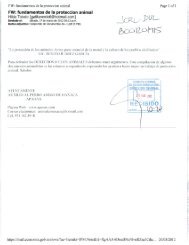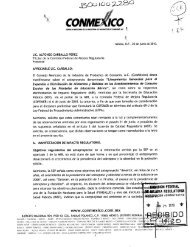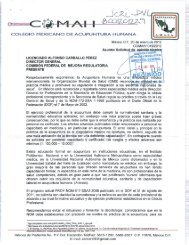Untitled
Untitled
Untitled
Create successful ePaper yourself
Turn your PDF publications into a flip-book with our unique Google optimized e-Paper software.
REVIEW<br />
Carbohydrate intake and obesity<br />
RM van Dam 1,2,3 and JC Seidell 3<br />
1 Department of Nutrition, Harvard School of Public Health, Boston, MA, USA; 2 Channing Laboratory, Department of Medicine,<br />
Brigham and Women’s Hospital, and Harvard Medical School, Boston, MA, USA and 3 Institute of Health Sciences, Vrije Universiteit<br />
Amsterdam, Amsterdam, The Netherlands<br />
The prevalence of obesity has increased rapidly worldwide and the importance of considering the role of diet in the prevention<br />
and treatment of obesity is widely acknowledged. This paper reviews data on the effects of dietary carbohydrates on body<br />
fatness. Does the composition of the diet as related to carbohydrates affect the likelihood of passive over-consumption and longterm<br />
weight change? In addition, methodological limitations of both observational and experimental studies of dietary<br />
composition and body weight are discussed. Carbohydrates are among the macronutrients that provide energy and can thus<br />
contribute to excess energy intake and subsequent weight gain. There is no clear evidence that altering the proportion of total<br />
carbohydrate in the diet is an important determinant of energy intake. However, there is evidence that sugar-sweetened<br />
beverages do not induce satiety to the same extent as solid forms of carbohydrate, and that increases in sugar-sweetened soft<br />
drink consumption are associated with weight gain. Findings from studies on the effect of the dietary glycemic index on body<br />
weight have not been consistent. Dietary fiber is associated with a lesser degree of weight gain in observational studies.<br />
Although it is difficult to establish with certainty that fiber rather than other dietary attributes are responsible, whole-grain<br />
cereals, vegetables, legumes and fruits seem to be the most appropriate sources of dietary carbohydrate.<br />
European Journal of Clinical Nutrition (2007) 61 (Suppl 1), S75–S99. doi:10.1038/sj.ejcn.1602939<br />
Keywords: obesity; diet; carbohydrate; fiber; sugar; glycemic index<br />
General introduction<br />
Background<br />
The prevalence of overweight and obesity has increased<br />
rapidly worldwide during recent decades, acquiring epidemic<br />
proportions in children and adults and in industrialized as<br />
well as transitional and developing countries (Popkin and<br />
Gordon-Larsen, 2004; Ogden et al., 2006). Excess adiposity<br />
increases risk of type 2 diabetes, arthritis, sleep apnea,<br />
hypertension, dyslipidemia, cardiovascular diseases, various<br />
types of cancer and premature death (Willett et al., 1999).<br />
Therefore, the importance of prevention and treatment of<br />
obesity is widely acknowledged. Changes in energy storage<br />
as body fat are affected by the balance of energy intake and<br />
energy expenditure, making diet and physical activity<br />
obvious targets for interventions. Effects of dietary composition<br />
on both energy intake and energy expenditure (dietary<br />
induced thermogenesis and resting energy metabolism) are<br />
plausible, based on results from animal experiments and<br />
metabolic studies in humans (Poppitt and Prentice, 1996;<br />
Correspondence: Dr RM van Dam, Department of Nutrition, Harvard School<br />
of Public Health, 665 Huntington Avenue, Boston, MA 02115, USA.<br />
E-mail: rvandam@hsph.harvard.edu<br />
European Journal of Clinical Nutrition (2007) 61 (Suppl 1), S75–S99<br />
& 2007 Nature Publishing Group All rights reserved 0954-3007/07 $30.00<br />
www.nature.com/ejcn<br />
Ludwig, 2002; Bray et al., 2004a, b; Halton and Hu, 2004;<br />
Slavin, 2005). Although substantial short-term weight loss can<br />
be achieved by many people, successful long-term maintenance<br />
of weight loss is much more difficult and compensatory<br />
physiological processes appear to stimulate weight regain<br />
(Hirsch et al., 1998). Effects on body weight found in shortterm<br />
metabolic studies can therefore not be readily extrapolated<br />
to long-term effects. This overview will present<br />
evidence for the effects of dietary composition related to<br />
carbohydrates on body fatness. Dietary factors that will be<br />
discussed include the proportion of total carbohydrates in<br />
the diet, free-sugars, sugar-sweetened beverages, the dietary<br />
glycemic index (GI) and dietary fiber. Studies have been<br />
identified through systematic and narrative reviews on these<br />
topics supplemented with searches in MEDLINE (PubMed)<br />
until July 2007. The emphasis is on longer-term studies, but<br />
shorter-term studies are also discussed depending on the<br />
availability of data for different exposures.<br />
Methodological considerations for studies relating diet to body<br />
weight<br />
Methodological limitations have to be considered in the<br />
interpretation of results on macronutrient composition in
















